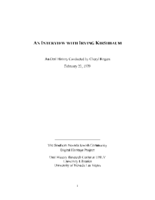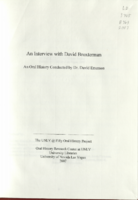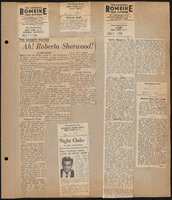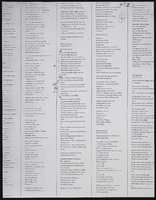Search the Special Collections and Archives Portal
Search Results

Transcript of interview with David Wasserman by Barbara Tabach, October 21, 2016
Date
Archival Collection
Description
For nearly two decades between 1950 and 1970, only one dentist of Jewish ancestry was known to be licensed to practice in Nevada. That was Dr. Joe Chenin. Finally, in 1971, the steadfast and easy mannered Dr. David R. Wasserman (1944 - ) broke through the barrier to become the second Jewish dentist serving the Las Vegas community. Over the following years, Dr. Wasserman built a sizeable following and immersed himself in the Jewish community of Las Vegas. Among his achievements is his participation and leadership in the formation of Las Vegas’ first Reform Jewish synagogue, Congregation Ner Tamid. He also would be active in the Jewish Federation. In 1992, as the HIV-AIDS epidemic affected dental offices throughout the nation, Dr. Wasserman saw an opportunity to get ahead of the infection. With the help of his wife Juanita Davis-Wasserman and his father-in-law Warren Davis, he developed, patented, manufactured and distributed a disposable tip for a treatment instrument commonly found in dental offices called a tri-syringe. This disposable tip brought sanitary options and great financial fortune to Dr. Wasserman and his family. In this oral history, Dr. Wasserman reflects on his joy of living in Las Vegas. He is a highly regarded dentist and leader in the Jewish community.
Text

Transcript of interview with Helen Smith by Emily Powers, March 4, 2008
Date
Archival Collection
Description
Helen Smith, born and raised in New Jersey, came to Las Vegas in 1956. She intended to visit relatives for a couple of weeks, but ended up staying. Her aunt convinced her to interview at Southern Nevada Memorial Hospital (SNMH) and Helen worked there for a year. She recalls three hospitals at that time: SNMH, the Eighth Street Hospital, and St. Rose de Lima in Henderson. Helen worked in the emergency room back east, so it was natural for her to start in the newly opened ER at Southern Nevada. She recalls treating many victims of accidents on the "Widow Maker", or route 95 to the Test Site, and compares the more advanced treatment and staffing back east with the Las Vegas small-town conditions. In talking about the medical advances she has seen over the years, Helen gives a detailed explanation of autoclaving, describes the duties of an ER nurse, and mentions the shifts that nurses used to work. She also discusses her own progression from relief nurse to day nurse to supervisor, and comparisons are made between hospital stays 30 and 40 years ago to hospital stays today. Helen refers to doctors and nurses that she worked with or knew of, talks about the types of things children were treated for, and shares several anecdotes and stories of patients and their treatment. She also expounds further on her work history at Sunrise Hospital, with her husband in their air-conditioning business, and as case manager for SIIS in workman's compensation. As Las Vegas grew in population, a process which started in the sixties, Helen notes that more specialists were attracted to local hospitals. She shares her own more recent experience as a patient and gives her opinion on the use of ERs for general care rather than true emergencies. Her closing remarks include descriptions of changes in nurses' responsibilities and comments on her husband's work with the Children's Shrine in telemedicine.
Text

Transcript of interview with Ron Lawrence by Dennis McBride, June, July and August 1997
Date
Archival Collection
Description
Ron Lawrence is one of the busiest people in the gay community, so I want him to know how much I appreciate his reserving time for me so that I could complete this oral history interview. The importance of his work toward the well-being of the gay community in Las Vegas cannot be measured, and much of what he's accomplished and otherwise made possible will live long after he leaves us. With Ron's consent to this interview, our knowledge of Nevada's gay history is greatly enriched and our record preserved.
Text

Transcript of interview with Irving Kirshbaum by Cheryl Rogers, February 23, 1979
Date
Archival Collection
Description
Interview with Irving Kirshbaum by Cheryl Rogers on February 23, 1979. In this interview, Kirshbaum discusses the Riviera Hotel where he began working in 1955. He also talks about the landscape of the Las Vegas Strip in the 1950s, and the state of gambling, comps, customer service, and dealer training. The interviewer asks about the treatment of minorities at the Riviera, and in Las Vegas generally, and the effect of corporate ownership on casinos.
Text

Interview with Louis John Vitale, May 19, 2004
Date
Archival Collection
Description
Text

Interview with Troy Ernest Wade II, June 16, 2004
Date
Archival Collection
Description
Text

Transcript of interview with David Broxterman by Dr. David Emerson, October 24, 2007
Date
Archival Collection
Description
Text
Audio clip of Marzette Lewis
Date
Archival Collection
Description
Part of an interview with Marzette Lewis by Claytee White on October 30, 2012. Lewis discusses community involvement in the movement for equality in elementary schools to stop bussing children to schools in different neighborhoods.
Sound


